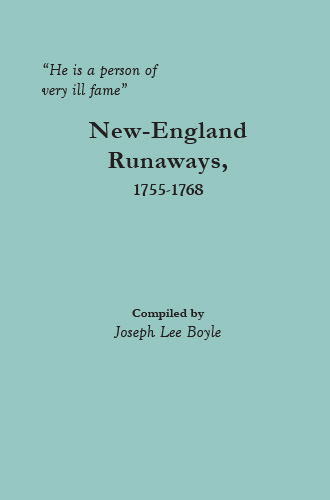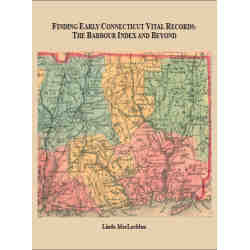
We are pleased to announce that we have a new installment in the “Genealogy at a Glance” collection of country research aids, Genealogy at a Glance: Russian Genealogy Research, by Vera Ivanova Miller, which is designed to guide researchers with ancestors not only in Russia but also in many countries of the former Soviet Union. Also available in March are new books by two of our most prolific authors: Dr. David Dobson and Joseph Lee Boyle. Mr. Boyle has extended his coverage of New England runaways advertised in colonial newspapers to 1768, while Mr. Dobson has a new collection of 17th-century Scottish soldiers who served and, in many cases, settled in Europe or America.
“He is a Person of Very Ill Fame,” much given to Talk and bad Company.” New-England Runaways, 1755-1768
Joseph Lee Boyle
This work marks Joseph Lee Boyle’s second volume of colonial New England runaways, as identified in contemporary newspaper ads. (The first volume covered the period 17??-1754.) The majority of the individuals in this compilation are runaway servants and slaves, but a number are military deserters, horse thieves, counterfeiters, jail breakers, an occasional murderer, as well as supposedly errant spouses. In compiling the present work, Mr. Boyle examined 25 newspapers from New England to Maryland. Each ad conveys a number of details about the runaway and his/her master, including names and aliases of the runaway, physical description, location in New England and where to contact the advertiser. In all, this book, contains about 1,500 runaway ads and names over 3,000 persons with connections to colonial New England. View Book Details
Scottish Soldiers in Europe and America, 1600-1700
Dr. David Dobson
Throughout the 17th-century thousands of Scottish soldiers of fortune participated in conflicts in Europe and America, and, in many cases, chose to settle where they had fought. in Flanders and the Low Countries Scots supported the Calvinist Dutch in their struggle against Spain during the Dutch Revolt. Between 20,000 and 30,000 Scots served in the army of Sweden’s King Gustavus Adolphus, particularly in the German, Polish, and Russian theaters of the Thirty Years War. The seventeenth century also saw Scots soldiers fighting for or against France. In 1627 King Charles I sent 2,000 Scottish fighting men to aid the English in the defense of the Huguenot stronghold of La Rochelle. Conversely, Scots Catholics could be found in French or Spanish armies of the period. The Wars of the Three Kingdoms, 1639-1651 involved Scottish soldiers in action in Scotland, England, and Ireland. Scottish Jacobites fought for the return of the Stuarts to the thrones of England and Scotland from James II in 1688 until the death of Bonnie Prince Charlie in 1788. By the end of the seventeenth century the Scottish Military Establishment was working closely with its English counterpart. Scottish regiments would fight alongside English ones against common enemies, for example in the War of the League of Augsburg in the 1690s. The political union of Scotland and England in 1707 led to the birth of the British Army, and soon Scottish soldiers were fighting under the Duke of Marlborough at the Battle of Blenheim in Bavaria.
This new publication, based on original and secondary sources, identifies between 2,500 and 3,000 Scottish fighting men who served in a variety of military theaters in Europe and in the Americas. Dr. Dobson identifies each combatant by name, a location, a date, and the source, and in a number of cases by the names of next of kin, vessels traveled on, place of origin in Scotland, or other particulars. View Book Details
Genealogy at a Glance: Russian Genealogy Research
Vera Ivanova Miller
Russians emigrated in several waves, coming from many countries of the former USSR, including Ukraine, Estonia, Lithuania, Latvia, Moldova, and Belarus, in addition to current-day Poland. An estimated 23 million people emigrated from Russia after the 1917 Revolution alone, with another large wave of emigration after World War II. Genealogy at a Glance: Russian Genealogy Research, by Vera Ivanova Miller, in just four, laminated pages, gives you all the information you’ll need to launch your search for your Russian ancestors. Topics covered include Russian names and religions; how to locate Russian ancestral places; researching in Russian archives, censuses, parish registers, and consular records; and where to go online to access databases and other helpful information. View Book Details






